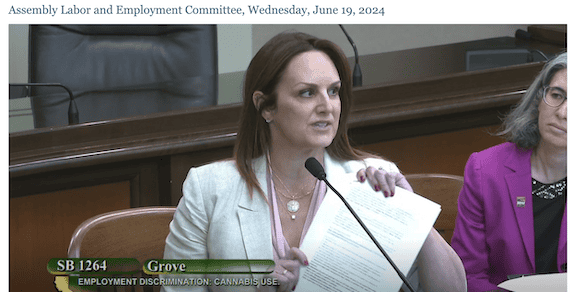
On June 19, the SB 1264 (Grove), a bill to exclude law enforcement from employment rights protections for off-the-job cannabis use, failed to pass the Assembly Labor and Employment Committee, in a 3-2-2 vote. The bill would have amended AB 2188, the Cal NORML–sponsored bill banning job discrimination based on urine or hair tests for inactive THC metabolites.
Watch the committee hearing (starting about 2:15 in).
Beth Malinowski of SEIU (Service Employees International Union) testified against the bill, saying, “Employers, including law enforcement, are free to test for recent use of cannabis by means of oral swab, blood or breath tests, which detect recent exposure to THC, the psychoactive component of cannabis, or by performance tests that detect actual impairment. The only thing they may not do is use urine or hair tests that detect inactive metabolites of THC which remain detectable for days or weeks after an impairment is passed.”
Kristin Heidelbach of UFCW (United Food and Commercial Workers) Western States Council in her testimony held up and read from the San Diego Sheriff’s Rules of Conduct governing against off-duty use of alcohol that would “render the employee unfit to report for their next regular tour of duty.” She said, “When we talk about holding law enforcement to a higher standard, next year is it teachers, after that is it nurses, after that is it doctors? The better thing to do is to loop cannabis into existing policies that are already in place, and trust law enforcement to be responsible with cannabis off the job.” The San Diego policy was sent to Cal NORML by a supporter via our Facebook page.
CELA (California Employment Lawyers Assn.), AFSCME CA (American Federation of State, County and Municipal Employees), California School Employees Assn., Cal NORML, DPA, and CCIA all added “me too” opposition to the bill.
Asm. Juan Alanis (R-Modesto), formerly a Sergeant for the Stanislaus County Sheriff’s department, asked about the “slippery slope” notion. “I don’t care if your grocery store worker is high,” said the bill’s author Sen. Shannon Grove (R-Bakersfield), arguing that sworn law enforcement officers should be held to a “higher standard.” (Or in this case, a less high one.)
Asm. Chris Ward (D-San Diego) spoke next, saying, “I don’t want an officer showing up to work high, or drunk,” adding that he tries be consistent with alcohol policy on cannabis. “We are maintaining a reverence for a higher standard, but the higher standard is ‘be a responsible adult.'”
Asm. Rick Chavez Zbur (D-West Hollywood) said he came from a law enforcement family, with several uncles and cousins on the force. “I have a problem with a system of testing on a legal activity that I don’t see as very different from alcohol use. We’re having trouble recruiting people into law enforcement, where we don’t appreciate them as we often should for putting their lives on the line, and then having a testing regime which doesn’t have much to do with what your condition is on the job is not the best approach.”
Committee chair Liz Ortega (D-Hayward) voted for the bill after she was able to secure a “sunset” provision making the law inactive after 2028. “This one was hard,” Ortega said, adding she’d spent time going back and forth on it. Joining her in supporting the bill were Republican committee members Flora and Alanis. Voting against the bill were Alex Lee (D-Milpitas), the chair of the legislature’s progressive caucus, and Asm. Ward. Not voting were Alan Lowenthal (sitting in for committee member Wendy Carillo) and Asm. Zbur.
Although Sen. Grove asked for the committee to reconsider the bill, we don’t expect it to advance. Thanks to all Cal NORML supporters who took action on SB 1264, including letter writers and citizen lobbyists who joined us on Lobby Day in May. As one participant put it, “We like weed so much we lobbied for the cops to use it!”



